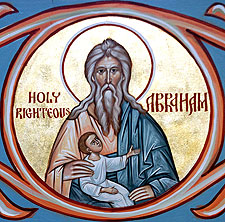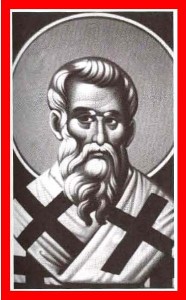|
|||
|---|---|---|---|
| This weekly bulletin insert complements the curriculum published by the Department of Christian Education of the Orthodox Church in America. This and many other Christian Education resources are available at http://dce.oca.org. | |||

In Romans 4: 13-25 Saint Paul comments on the faith of the Old Testament patriarch Abraham. Paul writes that the fulfillment of God's promise depends on faith, and not the Old Testament Law. The reason it depends on faith is "in order that the promise may rest on grace and be guaranteed to all his [Abraham's] descendants, not only to the adherents of the law..." Paul points to Abraham as a prominent example of such faith. This aged, childless man believed God's promise that he would be the father of many nations. Abraham believed in a God who "gives life to the dead and calls into existence the things that do not exist." It was in this way that the elderly patriarch hoped against hope. He was well aware that his own body was "as good as dead" and that his wife Sarah was barren. Yet "no distrust made him waver concerning the promise of God, but he grew strong in his faith as he gave glory to God, being fully convinced that God was able to do what He had promised." Saint Juvenal, Patriarch of Jerusalem, also had to maintain faith when it seemed unlikely that things would follow God's plan. He took part in two Ecumenical Councils, Ephesus and Chalcedon, and argued vigorously against the heresies, or wrong teachings, that were put forth by some people at those meetings. One specific idea he opposed was that of the Nestorians, who insisted at Ephesus that Mary be called only Mother of Christ, and not Mother of God. Juvenal, and those with him, said that because Jesus Christ is both God and man in one Person, there can't be any division between His Godhood and His manhood. Therefore His Mother has to be called "Mother of God." She is still a human being, but the Son she bore is both God and man. Though the Councils of Ephesus and Chalcedon rejected the proposed heresies, Juvenal had made enemies among the heretical teachers. They plotted and used violence to have him driven out of his position as patriarch. Empress Eudosia gave her allegiance to the heretic who replaced him. 
It must have seemed to Saint Juvenal that, with so many powerful people against him and his enemies' willingness to resort to force, he might never recover from the plots and lies. He had to hope against hope that the Church would not be permanently harmed by the teachings the heretics continued to spread. But finally the Empress was corrected by Symeon the Stylite, and Juvenal was reinstated. He was able to teach the truth and govern Jerusalem's church for almost forty more years, till he died in 458. Romans 4:20 tells us that Abraham "grew strong in his faith as he gave glory to God." For Abraham, Juvenal and all of us who face life's difficulties, it is when we give glory to God, in prayer and worship, that we grow strong and able to hope against hope. |
|||
